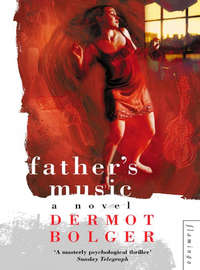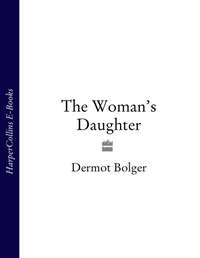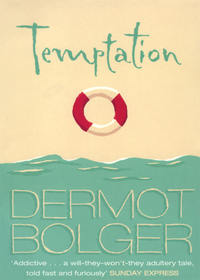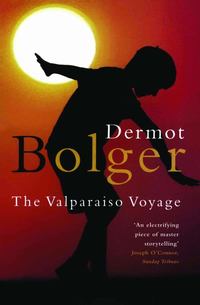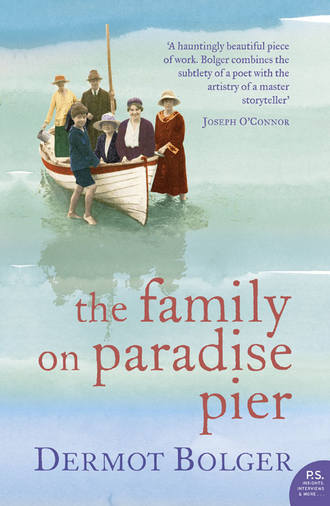
Полная версия
The Family on Paradise Pier
Returning to the house she found that the adults and the girls had moved into the drawing room. The front door was open and several local people had wandered in, attracted by the sound of the piano. Eva liked how people always spilled into the Manor House. There was old Dr O’Donnell from Killaghtee House, waylaid on his way home from a sick call, and two soldiers home on leave who clapped loudly when Maud finished her party piece. Eva took a window seat in the crowded room as Father sang the tone poem for violin and orchestra in his still unperformed Tir na n-Og symphony:
‘Far, far away, across the sea
There lies an island divinely fair
Where spirits blest forever dwell
And breathe its radiant enchanted air.’
Everyone applauded, taking pride in this local composition. A hush came as Mr Ffrench took Father’s place at the piano. This striking young officer was still a novelty in Dunkineely and few people had previously heard him sing. Mr Ffrench announced that while travelling with the Royal Navy he had encountered strange men, but none as unusual as the hero of Mr Percy French’s song, Abdullah Bulbul Amir. He commenced the opening bars, then stopped to stare at Eva.
‘What are you sketching, Eva?’
‘You.’
Mr Ffrench beckoned Eva forward. She felt embarrassed, unused to anyone except Mother paying attention to her sketching. Heads craned forward to await the officer’s opinion. He considered her drawing in a silence that seemed to last for ever.
‘Well, Eva, do you know what this officer thinks?’
‘No, sir.’
‘That you will be a true artist when you grow up. Let no one steer you from that path. Can I keep this?’
Eva nodded, too overcome to speak, and returned to her seat, watching as Mr Ffrench began to play, with no sheet music in front of him, but an unfinished sketch balanced on the holder instead. She longed to get back the drawing, to sketch in Mother and Father and all the other faces in the crowded drawing room as Mr Ffrench smiled at her, then began to sing in a wondrous voice. People demanded an encore and it was midnight before all the party pieces were performed, with the visitors departing into the night, calling their farewells as the cart moved off along the dark street.
Eva and Maud had hot milk and bread in the kitchen before being sent to bed. Eva was glad to go, but Maud felt that she should be allowed to stay up with the adults who would talk late into the night. The wooden shutters blocked out any moonlight. Both sisters lay quietly, awaiting Mother’s final visit. Eva gazed up at the picture of a young girl kneeling beside a bed in prayer. She could not remember a time when this picture had not hung on her wall. She listened for Mother’s shoes on the creaky step near the bend of the stairs. The door was ajar, gaslight filtering in from the corridor. Mother ascended the stairs and Eva heard her soft voice in Art’s room before she pushed their door fully open. Framed in the light she looked beautiful in her dark grey hostess gown. She sat for a time on each bed. There was no hugging. She never took them on her knee for cuddles. Instead they sensed the aura of her love as she quietly asked each daughter if they had enjoyed their day. Mother’s fingers played with Eva’s hair while they talked, braiding imaginary plaits as a faint fragrance filled the air. It emanated from the hand lotion Mother always rubbed into her palms after gardening. She wore no makeup or perfume, just this scent as her fingers stroked Eva’s hair for a final few seconds before she said goodnight and the door closed.
Maud turned over, quickly falling asleep. Eva lay awake for a while, still able to smell Mother’s hand lotion. It had been a perfect day after all and there was still her birthday to come. The story about being rejected at birth for being a girl seemed less scary now. She fell asleep, filled with warm milk and bread and knowing that she was truly loved.
TWO The News
Easter 1916
Last night the maid had gone out walking and saw the lights of a German submarine rising from the dark sea at St John’s Point. She ran back to the house, hysterical for her country and her virginity, calling out for Mr Tim. Mr Timothy Goold Verschoyle had cycled out along the Bruckless road to watch the lights approach, stopping Dr O’Donnell on his way home from a sick call to tell him how he’d been mistaken for the vanguard of an invading force. On the deserted road the two men had laughed but tension lurked behind their good humour because for once the maid’s hysterics might have contained an edge of truth. The declaration of martial law in Dublin City and environs did not extend to Donegal, where life appeared normal. But amidst the constant bushfire of rumours about an armed insurrection in that city there was so little confirmed news that nobody was certain what to believe any more.
On Monday some bizarre class of Republic had been proclaimed in the capital by a handful of desperadoes. In some accounts the insurgents were utterly isolated, but in other reports they were holding Dublin until German reinforcements arrived. Whatever was happening, Mr Tim knew that his cousin, Countess Markievicz, would be at the centre of it, in James Connolly’s Citizen Army. Last year in the Irish Times there had been a photograph of her in a fantastical military uniform, marching at the head of a group of young men who resembled boy scouts more than volunteer soldiers. Mr Tim had supported the Irish Volunteers who were founded to demand Home Rule from Britain, especially as that force threatened no offensive action but existed merely as a counterweight to the unionist militant Ulster Volunteers who were pledged to resist at any cost Westminster’s plans to grant Home Rule. When the Great War started, the Irish Volunteers leadership had declared it to be the duty of young men to fight against Germany to show how Ireland valued freedom and would deserve the reward of self-government within the Empire when peace came. Republican zealots like the Countess had broken away from the Irish Volunteers to form a small splinter force, but it possessed so little support that nobody took them seriously. Indeed her conversion to Catholicism had caused more scandal in the family than what, until this week, had been seen as amateur theatrics of militaristic posing.
Mr Tim did not know how many others had joined the Countess in this shocking fiasco in Dublin. He was just glad that all his family would soon be safely gathered in the Manor House. Maud was the last to arrive, having gone to spend three days with a schoolfriend in Londonderry before the trouble broke out. Thankfully the trains were running and she would now be in Dunkineely, being escorted home by Art. Art had decided to meet the train alone and tell Maud the news. Mr Tim regarded his eldest son’s offer to do this as a sign that he was adjusting to the role and duties of an heir. With the sudden death of Grandpappy in January, Art was now just one heartbeat – Mr Tim’s heartbeat – away from inheriting the family home. Art was growing up. Mr Tim could see a difference when he travelled home at the end of each term from Marlborough College. This Easter he had brought back two school chums who had not previously set foot in Ireland and were alarmed by the startling events in Dublin. Still they were decent chaps, familiar with the rituals of bad news. They had played tennis with Eva and Thomas this afternoon, then slipped off for a swim at Bruckless Pier to let the family be alone when Maud reached home. Having changed trains at Strabane before boarding the narrow-gauge service that chugged along the coast from Donegal town to Killybegs, Maud would be expecting her siblings to crowd the tiny platform at Dunkineely in welcome. The sight of Art standing alone would disconcert her because she had the quickest brain in the family.
Mr Tim kept watch at his window, wanting to be the first to greet her. He saw them approach along the main street in silence, Art carrying Maud’s case. Leaving his study, Mr Tim opened the front door. The street was utterly quiet, like it always went after the postmaster left his office holding a telegram. This had nothing to do with their news, but ongoing events in Dublin had created a strange atmosphere, with people saying little and little way of knowing if they meant what they said. Maud’s eyes were puffy but she had not cried as yet.
‘I’m all right, Father,’ she announced before he could utter a word. ‘It’s not as if I knew Oliver Hawkins well. We only met for the first time last summer.’
‘You were fond of him all the same,’ Mr Tim replied.
‘He was a boy that any girl would be fond of. When did you hear the news?’
‘Last week. Mrs Ffrench told us he was reported missing in action. I didn’t want to write to you at school. I thought it best to wait until you were here.’
‘I don’t see why…’ Maud looked away, anxious lest she betray her emotions. ‘Oliver sent me the odd letter from the army, but only I think so he would have some girl to write to, like other boys in his outfit. Nothing was ever…’ Maud looked at her father. ‘Still you were right not to write. So many girls get news about their brothers and cousins. You see them cry for days, with other girls crying as well, caught up in hysteria. Last summer Oliver’s parents thought he was going back to school from Donegal but he had other plans. He told me he was going to enlist on his last night here. I wanted to talk him out of it, but it seemed so gallant.’
‘There’s nothing gallant in war.’ Mr Tim glanced at Art, anxious to make his son understand. At thirteen he was tall and broad enough to pass for sixteen. Last month a fifteen-year-old boy, who lied about his age to enlist, was executed for cowardice in France. Art possessed a rebellious streak but, with his accent, no recruiting sergeant would dare sign him up as trench fodder.
‘Nothing gallant even in Dublin?’ Maud asked. ‘Outnumbered a hundred to one? The family I was staying with kept talking about the pro-German traitors fighting in Dublin. I wanted to say they were pro-Irish and I was related to one of them. But you know what Ulster Protestants are like. Have the rebels a chance, Father?’
‘A chance of what?’ Mr Tim asked. ‘It would be laughable if people were not being shot dead. Every second Dublin family has a son in France. The only people who rose with them were the slum hordes looting shops.’
‘I should visit Mrs Ffrench,’ Maud said. ‘She must be upset about Oliver.’
‘The poor woman has lost both brothers in this war already,’ Mr Tim replied. ‘She has aged so much worrying about Ffrench, who is seeing plenty of naval action. He’s quite the rising star but she just wants him safely home.’
‘How is Eva?’ Maud asked.
Mr Tim smiled. ‘Eva is Eva. Yesterday she decided to aid the Dublin rebels by climbing into a tree and writing a poem for them.’
The front door opened and Maud’s mother stood waiting to comfort her daughter. Father and son watched them embrace and disappear indoors. Glancing down the empty street Mr Tim felt a disconcerting sensation of being watched. He went inside where his son followed him into the study.
‘Are your two chums back yet?’
‘Last night one wanted to know where we kept the guns. He couldn’t believe that we don’t have a single one in the house.’
‘I’ve always hated shooting. However if they want to go hunting birds I’m sure we can arrange it with a neighbour.’
‘He meant guns for protection.’
‘Protection?’ Mr Tim smiled. ‘What does he expect, our neighbours to rush the house? Still I shouldn’t laugh. This trouble in Dublin is disconcerting. Such madness, with Irishmen already dying every day in France.’
‘Maybe that’s the problem. They’re dying in the wrong land.’
‘The problem, Art, is that they are dying at all. War solves nothing and cleanses nothing. It just leaves more bitterness waiting to spill over again.’
‘The fighting in Dublin is different,’ Art argued.
‘In what way?’
‘No one is forcing them to fight. There is no officer to shoot anyone who turns back. That’s one of the tasks they prepare the older boys for in school. That and being first out from the trench with a drawn sword to spur on your men to follow.’
‘You like your school, don’t you?’ Mr Tim probed. ‘I mean you’re popular, you have good chums.’
‘Some times I feel totally at home there. Other times I think I don’t fit.’
‘Being Irish can make you feel that.’
‘It’s not being Irish.’
‘What is it then?’
‘I don’t know.’ Art struggled for the words. ‘One to one I like most chaps there. Even the teachers are good eggs when not being jingoistic. But…sometimes when they are all gathered together…I find myself hating them. I hate their superiority, the sense of their absolute right to rule.’
‘The English have that,’ Mr Tim agreed. ‘Even our friend Mr Hawkins – poor man – is unshakeable in his self-belief. But they cannot be blamed for being what they are, any more than a fox can be blamed for being a fox.’ His father paused. ‘Maybe there’s something else you hate?’
‘What?’
‘Maybe you see the same qualities buried inside you. I mean no offence, but when asked to describe what we least like in people we often end up inadvertently describing ourselves.’
‘I’m not like my fellow students,’ Art stated angrily.
‘I know. But maybe deep within yourself you see a seed which, if not careful, might one day make you become like them. They will all find jobs ruling the Empire when this war ends. If that is what you want then doors will also open for you. Ffrench went to a poor school, yet see how well he is forging ahead. Imagine what you could do with your contacts.’
‘Is that why you sent me to Marlborough? What you want?’
‘I wanted to give you the best education I could afford. After that I merely wish you to be happy. I disappointed my father, our cousins too. They wanted me to achieve things. One said that I was a lotus-eater, lacking ambition, hiding away in my own little paradise here. But my ambitions were different from theirs. Perhaps I am inventing excuses and I have been a failure, but only on their terms. Because I never accepted their right to put their ambitions on my shoulders, I have no right to place my ambitions on yours. I’m merely saying that you may be afraid of being contaminated by the outside world. My days in Oxford were the loneliest time in my life. Young men boorishly drinking in societies. Grandpappy claimed that I ran away and I needed to toughen up to survive in the world. But I didn’t want to toughen up because something inside me would have died. You’re different. You have steel. Find your own path and stick to it.’
‘What if you don’t like my path?’
Mr Tim stared at the brooding portrait of Martin Luther. ‘The one thing I wish to give all of you is a conscience. If you trust to your heart you will not go wrong, no matter how others may judge you. Go and see if your chums are back. I want to finish something before I dress for dinner.’
Art left Mr Timothy Goold Verschoyle alone. Upstairs Maud would be crying, comforted by her sister and mother. Thomas would be glad all his siblings were home because he seemed happiest when they were all together. Brendan was probably reading in his den in the coach house. Of all his children Brendan was the one Mr Tim knew least about. He spent many evenings walking with the boy, but it was never fully clear what Brendan felt. Being so young, he made the others seem grown-up. Opening a drawer, Mr Tim took out new lyrics for the latest song cycle he was composing. The villagers thought his music remarkable. Neighbours often said how much they enjoyed hearing the sound of his piano filtering out onto the street. But no orchestra had yet played a single composition. Music companies returned his compositions with polite notes of refusal. But still he pressed on, motivated by a desire to bring beauty into this world or, maybe at a subconscious level, to feel some vindication in succeeding to prove his cousins wrong.
In Dublin now rebels were fighting behind barricades, with buildings shelled and slum dwellers looting amid the corpses of horses and soldiers. Boys trapped on barbed wire in no-man’s-land in France were screaming for comrades to end their agony with a bullet. Rats grew fat on corpses. Young Oliver Hawkins’s body might never be found. Mr Tim remembered how handsome Oliver had looked last summer. What must it be like to lose a son? He prayed that this war would end before his boys were old enough to be drawn in and that the Dublin madness would end without too many deaths. Scrutinising the lyrics he wrote this morning, they seemed a feeble pastiche of his favourite poets. At heart he knew this cycle would fare no better than the others, but still he worked on, knowing that these imperfect songs were the only poultice he could offer the world.
THREE Four Thousand Lamps
December 1917
Local Catholics had such long memories that Mrs Ffrench was careful not to betray any hint of proselytism about her activities. Older people still cursed the visiting Protestant clergymen who had tried to steal souls during the famine by offering soup to any starving wretch lured into attending their church services. Last year a Dublin Protestant was sacked after his Catholic employers discovered how he served tea each Sunday at the Free Breakfasts for the Poor Protestant Missionary Charity. Mrs Ffrench thought that it was easy for her fellow Baha’is in America to advocate Baha’i children’s parties as vehicles by which children of different social classes might learn to intermingle and be gently taught the truth, but in this remote part of Donegal any form of preaching was dangerous. Her husband might not think so, because Commodore Ffrench feared nothing. But, with the Bolshevik unrest in Russia, his leave was cancelled and, without him, their house felt empty and the winter hills desolate.
Still, with a war on it was unpatriotic to look glum. There was much that a woman could do. Last week Mrs Goold Verschoyle had hosted a Red Cross musical evening, attended by many young officers from the warships anchored in Killybegs Harbour. Mrs Ffrench had invited several to dine in Bruckless House, impressing them by her knowledge of Northern Russian ports. Not that Commodore Ffrench ever divulged naval secrets, but his last letter had been filled with a boyish excitement about his latest mission. The northern route into Russia was always important as a line for supplies to be ferried into the ice-free port of Murmansk and sent on by rail to St Petersburg. However it had been an unglamorous naval backwater until the recent revolution in Russia, when it now became vital to prevent Murmansk and Archangel falling into the hands of the dangerous Bolsheviks who had seized power. This was the moment of destiny which her husband had been waiting for. Over dinner the officers had agreed that if he could help to fight off the Bolsheviks and hold these ports he would return a hero.
When the Tsar abdicated in February nobody suspected that the Bolsheviks would seize power – indeed few people, including Mrs Ffrench, knew much about them. But the world was out of kilter in these days of incessant bloodshed, with nothing predictable. The Dublin rebels – booed off the streets last Easter, with James Connolly and the other leaders executed – had recently been welcomed home from internment camps like returning heroes instead of hooligans who had levelled their own city. Mrs Ffrench was glad to have a Baha’i spiritual master like Abdul-Baha to make sense of these changes. His instruction was to spread light and human fellowship through every class and creed she came in contact with.
This was her intention behind today’s party. Every child from Bruckless and Dunkineely was invited. The attendance – smaller than she hoped for – was a curious mix, with prosperous Protestant children who were used to enjoying her gardens mingling uneasily with a few local poor Catholics. The better-off Catholic tradesmen had kept their children away. They liked the notion of their offspring taking refreshment with the gentry on her lawn, but not if they had to mix with their own lower social classes.
At first there was little mixing, as Protestant children formed one clique and the Catholics another, too ill at ease to enjoy themselves. She suspected that some Catholics had never attended any type of party, let alone an afternoon one. For a terrible moment she even envisaged a fight breaking out, a miniature re-enactment of the riots in Moscow. The servants were thinking this too, from the way they whispered to each other, but then the arrival of Eva Goold Verschoyle put everyone at ease because children from all creeds were comfortable with her.
Although Mrs Ffrench told people that every child was always welcome at Bruckless House, few ever called. Yet she never visited the Goold Verschoyle household without seeing village urchins wandering freely about the tennis court or sitting with Eva in the old coach house, taking turns to use her paints and brushes, laughing with their hands streaked in watercolours. Eva quickly became the centre of the party now, not even conscious of how she drew the children into the games she suggested. Perhaps it was her size, with many children towering over her. Or maybe it was her aura. At fifteen, Eva was older than her years in some respects, yet far younger in others.
Soon Mrs Ffrench found herself peripheral to her own party, a bystander who would love to swing a four-year-old girl around like Eva did or have toddlers cluster about her skirt while she told stories. She kept trying to mingle and talk to each guest but a glass wall existed with the village children that she could not break down.
Still, she loved the sounds of laughter and was delighted at having risked holding the party outdoors during the few hours of winter sunlight. There was real Baha’i happiness by the end as children relaxed with each other. Village children waved as they walked away in clusters, with the Protestants being collected in ponies and traps. Finally only she and Eva were left, excitedly discussing the party on a sofa in the library while, outside, serving girls cleared away the mess on the lawn.
She offered to have her man drive Eva home, but Eva insisted that she loved the two-mile walk in twilight. Mrs Ffrench knew that she would be safe because something about the child’s innocence suggested that Eva could not be hurt so long as she never left Donegal. Eva sympathised at how lonely Christmas would be in Bruckless House with Mr Ffrench away and asked would the Hawkins family ever come back to visit.
‘I suspect not, dear. Bruckless holds too many memories. These days a lot of ghosts sit on empty chairs at dinner. It would be hard for them not to keep seeing Oliver in their minds swimming down at our pier.’
Mrs Ffrench stopped, surprised by her tears. Grief was a sly thief always waiting in ambush. She had thought she was over the worst of the anguish at losing her two brothers, but last month’s news that her sister’s husband had also been killed had brought back her dreams of blood. When she woke some nights now she was afraid to touch the sheets, having dreamt that they were saturated in blood. She hated the three-card-trickery of these insidious dreams. In them she could be back with her brothers in their nursery, watching them play with boxes of tin soldiers. Next moment they would be wading through barbed wire and foxholes where dying men screamed, still only boys holding their tin soldiers, oblivious to danger. Then they would become her own unborn sons walking towards the German guns, not hearing her screaming to warn them until they were shot and fell. She always woke with a start from such dreams, her hand instinctively reaching down between her legs where she bled every month whether her husband was home on leave or not. Five years of marriage, stained by unwelcome blood. The Commodore had devised a code so that she could send him news after each visit home. They had names chosen if it was a boy or a girl and a locked room set aside to be a nursery. At thirty-one she was still young enough. When his victory at Murmansk was achieved, he would come home for them to try again, as often and with as much passion as it took. To compensate for all the deaths, her first child would be a boy.





